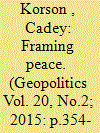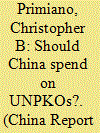| Srl | Item |
| 1 |
ID:
138981


|
|
|
|
|
| Summary/Abstract |
Despite conducting sixty-six peacekeeping missions, the United Nations (UN) must repeatedly justify the necessity and wisdom of continuing these operations to the international community. Domestic success is contingent to a large degree on the willingness of citizens to cooperate with peacekeepers. Consequently, public perception in both the host country and abroad has become crucial to the continuation and maintenance of UN Peacekeeping Operations (UNPKO). A discourse analysis of domestic and international newspapers, radio transcripts, and television broadcasts about contemporaneous UNPKOs in Haiti and Côte d’Ivoire reveals staggering disparities. Diverging interpretations of mission mandates, violence, censorship, and colonial practices contribute to the way in which peacekeeping missions are perceived. This article identifies how current UNPKOs are perceived domestically and internationally and emphasises the role of these perceptions as a basis for evaluating and improving these operations.
|
|
|
|
|
|
|
|
|
|
|
|
|
|
|
|
| 2 |
ID:
163380


|
|
|
|
|
| Summary/Abstract |
When China joined the United Nations in 1971, it viewed UN peacekeeping operations (UNPKOs) as an instrument for powerful countries to exploit weaker countries. Today, under Xi Jinping, China contributes the largest number of UN peacekeeping personnel among the five permanent (P5) members of the UN Security Council. This article presents findings from a pilot study based on a survey conducted at two international universities in China in the fall of 2016, regarding how Chinese students perceive China’s UNPKO involvement. A total of 297 Chinese university students participated in this survey. Given that there has been little scholarship on how Chinese citizens view China’s UNPKO spending or involvement, this article aims to contribute to our understanding of this subject.
|
|
|
|
|
|
|
|
|
|
|
|
|
|
|
|